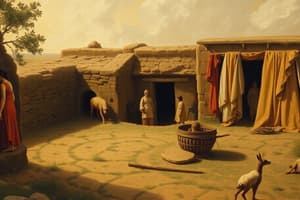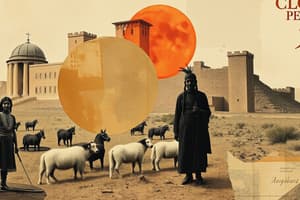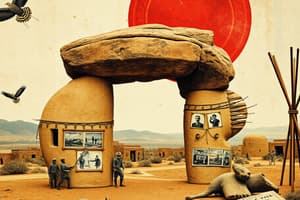Podcast
Questions and Answers
The king of the Franks who conquered Gaul and converted to Christianity was:
The king of the Franks who conquered Gaul and converted to Christianity was:
- Martel
- Clovis (correct)
- Charles
Scandinavia raiders from the north were:
Scandinavia raiders from the north were:
- Magyars
- Vikings (correct)
When a lord inherited a manor, he also gained control of:
When a lord inherited a manor, he also gained control of:
- Serfs (correct)
- Knights
The sacred rites of the church are called:
The sacred rites of the church are called:
Popes claimed:
Popes claimed:
Monks who traveled around Europe preaching to the poor were called:
Monks who traveled around Europe preaching to the poor were called:
A __________ set out rights and privileges of a town.
A __________ set out rights and privileges of a town.
Medieval merchants joined together in __________ to reduce financial risk.
Medieval merchants joined together in __________ to reduce financial risk.
How were Germanic tribes governed?
How were Germanic tribes governed?
Why did Charlemagne's empire break up after his death?
Why did Charlemagne's empire break up after his death?
Describe the mutual obligations that emerged under feudalism.
Describe the mutual obligations that emerged under feudalism.
How did medieval manors function?
How did medieval manors function?
Flashcards are hidden until you start studying
Study Notes
Key Historical Figures
- Clovis: King of the Franks who conquered Gaul and converted to Christianity, playing a significant role in the Christianization of the region.
Viking Raids
- Vikings: Scandinavian raiders known for their voyages, warfare, and trade throughout Europe during the late 8th to early 11th centuries.
Feudal System Structure
- Serfs: Peasants who were bound to the lord’s land and provided labor in exchange for protection and a place to live.
- Mutual obligations in feudalism involved lords dividing land among lesser lords, creating a hierarchy of loyalty and service.
Church Authority
- Canon Law: The sacred rites and regulations governing the Church and its members.
- Excommunication: A powerful tool used by popes to assert papal supremacy by excluding individuals from the Church, thereby threatening their spiritual well-being.
Role of Monasticism
- Friars: Monks known for their mobility and preaching, focusing on serving the poor and spreading Christian teachings across Europe.
Economic Developments
- Charters: Documents that outlined the rights and privileges granted to towns, facilitating local governance and economic development.
- Partnerships: Arrangements formed by medieval merchants to share resources and risk, promoting trade and economic stability.
Governance of Germanic Tribes
- Tribal governance was informal, lacking written laws, relying instead on loyalty sworn to kings, establishing a personal connection between rulers and subjects.
Impact of Charlemagne's Death
- Following Charlemagne's death, the empire faced invasions, particularly from Germanic tribes, leading to fragmentation and political instability.
Function of Medieval Manors
- Medieval manors operated as self-sufficient estates governed by lords, where serfs provided agricultural labor and adhered to the authority of the landholder.
Studying That Suits You
Use AI to generate personalized quizzes and flashcards to suit your learning preferences.




